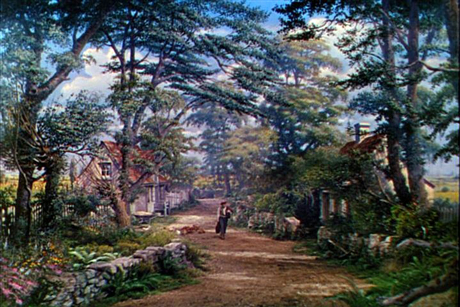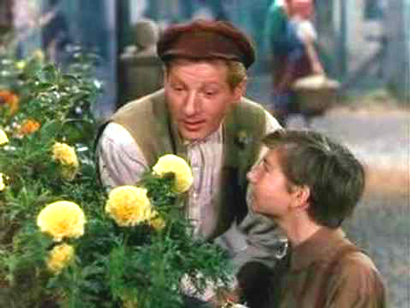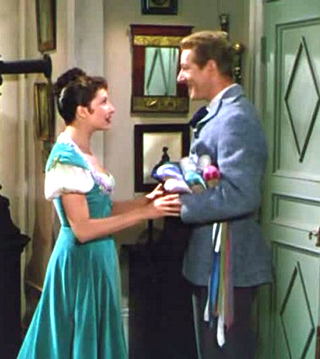
 |
|
|
|
One of Samuel Goldywyn's biggest hits and perhaps star Danny Kaye's most oft-revived movie, Hans Christian Andersen has held a firm roost for 60 years as a family favorite. It also marks a shift in Danny Kaye's screen image, from antic comedian to a more heart-warming stance interacting with children. His charm on screen and in multitudes of personal appearances led him to become UNICEF's first ambassador-at-large just two years later. Filmed in beaming Technicolor and designed to look like a children's storybook, Hans Christian Andersen does not claim to be a biography of the Danish poet and writer of countless fairy tales. The actual Andersen reportedly had an unhappy life and never married any of the women he loved from afar. Samuel Goldwyn turned to story doctor Myles Connolly and writer Moss Hart for a solution to the script problem. They chose to frame Andersen's story almost like one of his stories, as a fantasy incorporating some of them along the way: "The Ugly Duckling", "The Little Mermaid". The writers also slip in a note of darkness and melancholy, to reflect the real Andersen's failure to find romantic happiness. With Frank Loesser's gentle songs the Technicolor production a pleasant experience different than most other children's epics. Probably too tame for most moppets of 2012, the movie harks back to a time when warm and affectionate children's storytelling didn't need a violent conflict. 
Lowly rural cobbler Hans Christian Andersen (Danny Kaye) is an inoffensive dreamer who thinks up clever and insightful stories to tell children. He has such a following that the schoolmaster (John Brown) petitions the burgomaster (John Qualen) to have him thrown out of town. Fearing that the sensitive Hans will be irreparably hurt, his young assistant Peter (Joseph 'Joey' Walsh) talks him into seeking fame and fortune in the capitol of Copenhagen. Hans and Peter are dazzled by the big city, but Hans finds himself in jail for mistakenly setting up his cobbler's box on a revered statue in the marketplace. Peter gets him let loose when he overhears temperamental ballet impresario Niels (Farley Granger) say that he needs a cobbler immediately. Hans goes to the theater and sees Niels verbally mistreating the led ballerina, Doro (Jeanmaire), who gives Hans a pair of ballet slippers to alter. Having fallen immediately in love, the overly impressionable Hans is convinced that it is his duty to free Doro from the terrible Niels. He writes a story, "The Little Mermaid", for her. Weeks pass while the ballet company is out of town. Hans makes up a story ("The Ugly Duckling") to comfort an unhappy child. The boy's father is a publisher, and asks permission to print the story. The ballet company returns to perform a new work based on Hans' veiled 'love story' about the mermaid. Hans discovers that Niels and Doro are married but does not realize that they are actually very happily married, and that their vicious arguments are professional spats that do not extend beyond the ballet stage. Peter tries to explain, but Hans is blinded by his infatuation. He's still set on liberating Doro from the 'terrible' Niels. Hans Christian Andersen is children's fare by virtue of its delightful music and Danny Kaye's winning performance. Kaye is quite good -- he plays an innocent dreamer who loves children and has a limited understanding of the harsh adult world, and yet doesn't come off as a hick or a simpleton. Hans' fertile imagination and quick mind invent little fantasy stories that have a bearing on reality. As a dreamer and a fantasist he's a charmer, with a personality that's impossible to dislike. The movie begins by stating that what we are about to see is not a literal biography but a fairy tale version of Hans Christian Andersen's life. As such it takes place in a fantasy Denmark of tree-lined paths and cute little communities, packed with little cherub-children that love to sit and listen to Hans's entertaining stories. Kaye is of course terrific at entertaining small groups, even in the artificial setting. There must have been fifty stage mothers just off camera, each hoping their particular moppet's chipmunk cheeks are the cutest. Most of the stories are brief monologues told by Kaye. 
But there are also four ballet sequences, including a 17-minute retelling of "The Little Mermaid" that bears comparison to other musical ballets of the mid-century boom in Technicolor musicals. Reneé "Zizi" Jeanmaire is the star mermaid that endures a sad romantic experience on dry land. Instead of special effects the choreography works with Roland Petit's stage effects, like scenery 'waves' in which the mermaids frolic (among them, possibly, Barrie Chase). The sequence has some of the art-craft appeal of Powell, Pressburger & Cardiff's The Red Shoes without approaching that film's level of dramatic intensity. But it's good ballet and handsomely constructed -- a few setups remind us of the "Out of My Dreams" ballet in 1955's Oklahoma! A truly jarring transition effect sees the image shatter into a hundred colorful pieces, leaving untouched a standing figure in the foreground. There are no villains in Hans Christian Andersen, only people that don't understand Hans. The story seems a trifle until one realizes that it is actually an insightful look at the 'dreamer'- type personality. Hans doesn't relate well to the real world and instead re-interprets it through his stories, which are really about his own feelings of abandonment and failure. Some biographers have correlated Andersen's unhappy characters (The Little Mermaid being a prime example) to his own romantic failures, and others have characterized Andersen as a frustrated homosexual. In the movie, Hans doesn't fit in the workaday world and misinterprets interpersonal relationships, which tend to be complex, like Niels and Doro's faux-abusive charades. Hans is a good man capable of strong attachments and loyalties but also prone to grave mistakes, as when he rejects Peter for trying to disabuse him of his illusions. Peter knows that Hans isn't capable of handling harsh reality, such as finding out that his friends and neighbors want him to go away and never come back. The lesson is actually quite "adult": Hans' childlike faith and optimism is in actuality a functioning handicap. The film ends with Andersen finding happiness as a beloved author and storyteller to kiddies, which at first look seems a bland 1950s way of keeping our hero pure and sexless. Hans must content himself with foregoing the love he so badly needs. Where's the sweet country girl to sweep him off his feet? Is Andersen some kind of mythical figure that, if he were to have a sex life, would lose his ability to spin magical stories? Hart and Connolly's 'fairy tale' has more to say about the real Hans Christian Andersen's problems than it lets on. The bottom line: all I knew about Hans Christian Andersen until now is the song "Wonderful Copenhagen", which appeared in TV promos and captured a sense of magic in a sound bite lasting only a few seconds. I think that when I was a small child the movie would have put me to sleep, and that in my teen years I would have been militantly hostile to it. But as an adult I am impressed with its indirect approach to the problems of an impractical dreamer in this world -- anybody who aspires to similar goals will understand and sympathize with Hans. The Warner Home Video Blu-ray of Hans Christian Andersen is a very good HD rendering of an original Technicolor production. Good transfers of 3-strip Technicolor films are a hit-and-miss affair because disc companies must work with whatever composite Eastmancolor elements were made for the film to produce post-Technicolor prints... either that or perform involved digital restorations prohibitively expensive for all but the most in-demand titles. The good news is that Hans Christian Andersen has no serious color or registration problems in all but a small handful of shots, and that a (presumed) digital fix-up job has optimized the presentation without wiping out film grain or flattening the image. We're not talking Wizard of Oz clarity, but the candy colors of Harry Stradling's cinematography are well represented and the high definition images capture a lot of the life left out of earlier DVD encodings. 
Warners' book packaging contains a 40-page souvenir booklet that discusses the film's famous talent while telling background stories that have stuck to the film, such as the nervousness in Denmark over their national hero being represented in a movie by a "clown". It seems a reasonable concern considering Danny Kaye's earlier track record as a vocal cut-up and face-puller. As it turned out, the song "Wonderful Copenhagen" gave a boost to Danish tourism. Kaye's conversion from super-comedian and stage entertainer to an international diplomat for peace, family values and security for children helped his image at this time. Although popular, the conservative press and the radical right had circulated hateful rumors that Kaye was anti-American and possibly some kind of sexual deviant -- as a child I remember hearing adults discussing these claims even into the early 1960s. The fifties was a time that held as suspect men that didn't assert masculine signals of aggression and womanizing. Kaye's whimsy and silliness didn't fit the conformist profile. The souvenir booklet also goes into the ballet background for the film - choreographer Roland Petit is referred to as having sexed up' the ballet in the late 1940s. His star Jeanmaire didn't make it big over here, perhaps because a shrinking Hollywood already had Leslie Caron. Her other studio picture is the dismal Bing Crosby remake of his own Anything Goes, the movie that forces its stars to sing and dance with little propeller beanies on their heads. An interesting nugget -- Joseph "Joey" Walsh had a long acting career, and was later the screenwriter of Robert Altman's freewheeling comedy California Split. Among the on-screen moppets are Lee Aaker and future drag-racing celebrity Tommy Ivo.
On a scale of Excellent, Good, Fair, and Poor,
Hans Christian Andersen Blu-ray rates:
Reviews on the Savant main site have additional credits information and are often updated and annotated with reader input and graphics. Also, don't forget the 2011 Savant Wish List. T'was Ever Thus.
Review Staff | About DVD Talk | Newsletter Subscribe | Join DVD Talk Forum |
| ||||||||||||||||||